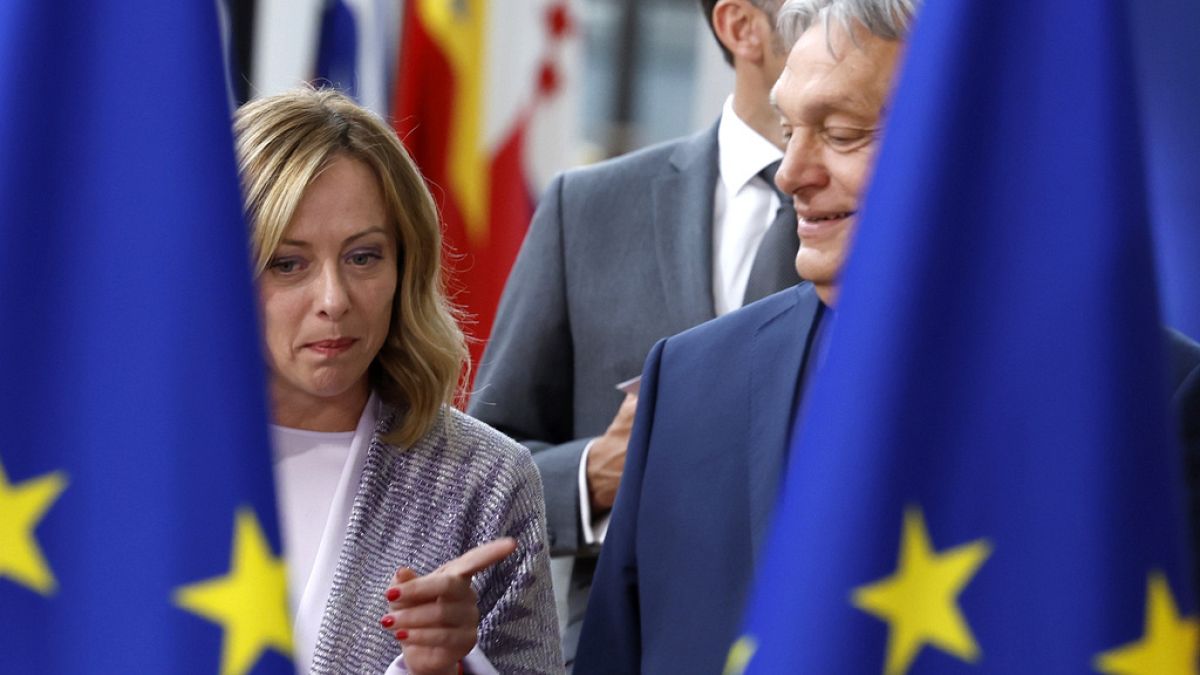The recent EU high-level position nominations have sparked controversy with Hungarian and Italian Prime Ministers Viktor Orbán and Giorgia Meloni criticizing the undemocratic process. Despite the right-wing gaining prominence in the European Parliament, Orbán and Meloni were excluded from preliminary negotiations and failed to secure high-level seats for their political groups. European Commission President Ursula von der Leyen, from the centrist EPP, was nominated president of the Commission, former Socialist Portuguese Prime Minister António Costa as president of the European Council, and Liberal Estonian Prime Minister Kaja Kallas as the High Representative for Foreign Affairs and Security Policy. Meloni and Orbán expressed their dissatisfaction with these nominations, stating they did not reflect the outcome of the EU elections.
Meloni, representing the European Conservatives and Reformists group, denounced the proposed top jobs as being formulated incorrectly and not representative of the EU election results. Orbán echoed similar sentiments, accusing the EPP of forming a coalition with the left and liberals. Despite their objections, their positions are unlikely to have any impact on the nominations. Von der Leyen may still seek support from Meloni’s 24 Brother of Italy MEPs for her parliamentary confirmation vote in July. Furthermore, Orbán’s unexpected stance sets the tone for Hungary’s upcoming assumption of the revolving presidency of the EU Council.
In response to Orbán’s position, German Green MEPs Daniel Freund and Damian Boeselager wrote a letter to European Council President Charles Michel, urging him to block the upcoming EU Hungarian Presidency. They argued that it was time to stand up against Orbán’s behavior, citing Hungary’s high levels of corruption and disregard for the rule of law. The letter, signed by 20,000 citizens, highlighted the damaging impact that Hungary’s representation could have on the EU’s reputation, particularly considering Orbán’s government’s past remarks comparing the EU to a dictatorship.
The nomination process and subsequent criticism have highlighted the divided political landscape within the EU following the recent elections. The right-wing parties, such as Meloni’s Brothers of Italy and Orbán’s Fidesz party, have voiced concerns over the lack of representation and alignment in the high-level positions. The centrist EPP, socialists, and liberals have come under fire for what is perceived as an undemocratic allocation of key roles. This discord underscores the challenges facing the EU as it navigates through complex political dynamics and seeks to unify member states under common goals and values.
The disagreement over the high-level positions also sheds light on the broader issue of democratic representation within the EU institutions. Orbán and Meloni’s objections reflect a desire for a more transparent and reflective decision-making process that takes into account the outcomes of the EU elections. As the EU continues to evolve and adapt to changing political landscapes, the need for greater inclusivity and representation becomes increasingly apparent. The criticisms raised by Orbán and Meloni serve as a reminder of the importance of upholding democratic principles and ensuring that all member states have a voice in shaping the future of the EU.
In conclusion, the controversy surrounding the EU high-level position nominations underscores the challenges and complexities of EU politics. The clash between the right-wing parties and the centrist bloc exposes underlying tensions and disagreements over the direction and leadership of the EU. As member states grapple with issues of representation, democracy, and transparency, it is essential for the EU to address these concerns and work towards a more inclusive and cohesive political system. By fostering dialogue, cooperation, and mutual respect among member states, the EU can strive towards a more unified and effective governance structure that reflects the diverse interests and perspectives of its citizens.










